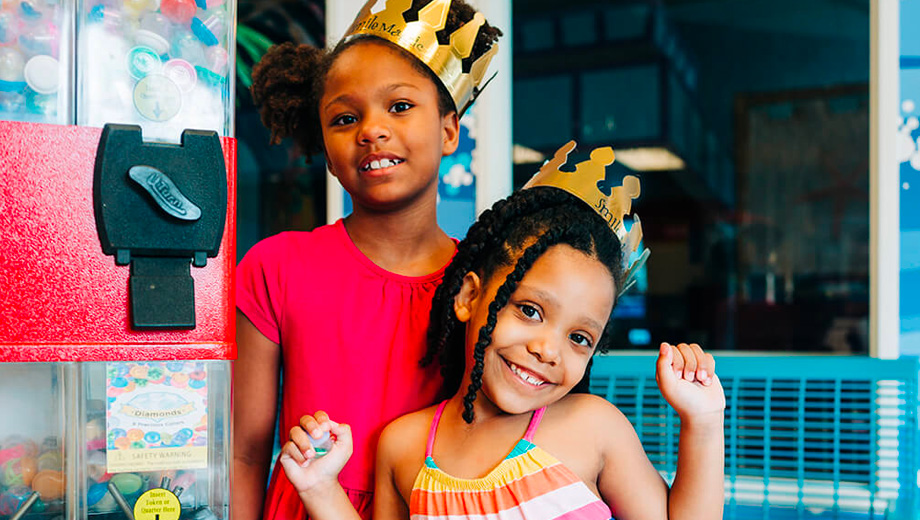Care For Your Child’s Teeth & Gums – A Healthy Diet Means Healthy Teeth
All Katy preventive dental treatments promote healthy eating patterns to get healthy teeth. Prevention is key for good oral health, and a balanced diet will help your child achieve those goals.
We recommend having a variety of options and healthy options for your children’s diet. You should try to avoid as much sugar as possible for snacks.
Brush your child’s teeth after every meal or at least twice a day to continue preventing tooth decay. Avoid constant snacking, and choose nutritious foods. Vegetables, low-sugar treats, and yogurt and cheese are always healthy options for your little one.
How Do I Prevent Cavities?
Maintaining good oral hygiene habits helps to get rid of food particles between your teeth. Those particles can attract harmful bacteria and lead to cavities.
You should begin cleaning your infant’s teeth as soon as they erupt with an extra soft-bristled brush or a small silicon bristles brush. Remember that the idea is preventing plaque buildup.
Try to plan your baby’s meals to avoid putting them to bed after feeding them. Ideally, you should avoid putting your child to bed after giving them a baby bottle filled with anything other than water. See “Baby Bottle Tooth Decay” for more information.
Babies who already have a couple of teeth need even more attention. You should always consider visiting the dentist by their first birthday or when they have their first primary tooth, according to the American Academy of Pediatric Dentistry (AAPD).
You should brush your baby’s teeth with fluoridated toothpaste as soon as the first tooth erupts to strengthen its enamel protective layer. A ‘smear’ or ‘grain-of-rice sized’ for children under 3 years of age and a ‘pea-sized’ amount for children older than 3. If you do not want to use the recommended fluoridated toothpaste, a good alternative is nano-hydroxyapatite toothpaste.

Schedule visits to a pediatric dentist like Dr. Elizabeth Chen every six months after their first birthday. These visits help ensure that your kid enjoys a lifetime of good dental health. When the time is right, your kid’s dentist will also recommend preventative dentistry treatments like Fluoride Applications or Dental Sealants to prevent decay.
Seal Out Decay
A sealant is a special material used to cover the chewing surface (grooves) of premolars and molars at the back of your child’s teeth. Sealants block all food particles from lodging in the tooth grooves and prevent plaque and acid build-up.
The idea is to protect areas prone to tooth decay, dental cavities, and infections. According to this study published in the Journal of the American Dental Association, dental sealants can help reduce the development of pit and fissure cavities by up to an outstanding 80%.
Sealants are very durable, but they are not permanent. Check with your child’s pediatric dentist to figure out how often you will have to bring your kid to have their sealants replaced.
Fluoride
Fluoride is a naturally-occurring element that helps teeth. You have to be careful not to give your child too much of it at any given point. Fluoride can strengthen your child’s teeth because it helps reabsorb minerals from various sources and keep the enamel layer strong.
Be mindful not to abuse fluoride doses as it can lead to dental fluorosis. This condition results in a white or brown discoloration of permanent teeth.
The idea is to integrate fluoride-rich foods and drinks into your child’s diet while being careful not to abuse additional fluoride supplements you can get at some vendors.

We don’t want to alarm you unnecessarily. Accidentally ingesting a little of their toothpaste won’t cause a case of fluorosis in your child. You should be more worried about artificially-flavored toothpaste that can attract unsuspecting children to want to eat it.
Swallowing all the contents from a fluoridated toothpaste tube or the inappropriate intake of fluoride supplements can contribute to fluorosis. Avoid giving fluoride drops, tablets, and vitamins to young children. Unless prescribed by a dentist.
Consult with your pediatric dentist in Katy about which infant formulas are safe for your child. Keep an eye out for concentrated infant formulas, soy-based infant formulas, and even some infant chicken products. Some contain added fluoride that, when reconstituted, can be too much fluoride.
Take a quick moment to read the nutrition label, as some beverages also
contain high levels of fluoride. The important thing is to find the information your need about how these factors affect your children’s dentistry work.
Parents can take the following steps to decrease the risk of fluorosis in their children’s teeth:
- Watch out for the amount of toothpaste you use for your child. A grain-of-rice-sized portion for kids younger than 3, a pea-sized amount for kids 3 years and older.
- Keep an eye out for any fluoride supplements you may be giving your child, and consult with a professional to know how much is enough.
- Don’t give fluoride supplements to children under 6 months of age.
- Check if your city’s water supply already includes fluoride.
Mouthguards
Injuries are more common as children start participating in additional recreational activities and sports. Using a custom mouthguard can help prevent damage to your child’s teeth. These are particularly useful to avoid dental emergencies.

Mouthguards can keep your kid’s teeth from breaking upon impact. They can also help minimize damage to softer tissues such as lips, tongue, or cheeks.
Ask a pediatric dentist about the differences between custom and store-bought mouth protectors to determine what works best in your case.
Beware of Sports Drinks
While we are on the subject of sports, all parents should be careful about sports drinks. They have high concentrations of sugars and acids with a potential for eroding your kid’s teeth.
The primary goal is to improve your kid’s physical health through sports, don’t undo your efforts by neglecting their dental health.
These drinks can be as damaging as some sodas because they can easily contribute to the erosion of your child’s enamel layers around their teeth and promote the development of cavities.
To avoid dental problems, children should turn away from only using sports drinks and hydrate with water before, during, and after sports.
If your child does drink sports beverages:
- Reduce the frequency
- Swallow immediately and do not swish them around the mouth
- Neutralize the effect of sports drinks by alternating sips of water with the drink
- Rinse mouthguards only in water
